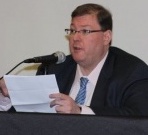FOR IMMEDIATE RELEASE
Contact Information: Hussein Ibish
February 24, 2010 - 1:00am
 ATFP Senior Fellow Hussein Ibish participated in a day-long conference on Saturday, February 13 at Rutgers University on Iran and the Arab World: New Horizons. Ibish appeared on a panel entitled "Iran, the US and the Arab World," along with professors Roozbeh Shirazi of CUNY and Stephen R. Shalom of William Paterson University. Ibish gave “an overview of contemporary Arab attitudes towards Iran,” focusing on the views of five key constituencies: pro-Western Arab regimes, mainstream Sunni Arab public opinion, Sunni Arab Islamists, Iranian allies and clients in the Arab world, and finally constituencies in Iraq. He told the audience that Arab perceptions of Iran are so complicated, varied and often ambivalent that only the crudest outlines could be sketched in a conference lecture, but that some of the more significant elements could be described.
ATFP Senior Fellow Hussein Ibish participated in a day-long conference on Saturday, February 13 at Rutgers University on Iran and the Arab World: New Horizons. Ibish appeared on a panel entitled "Iran, the US and the Arab World," along with professors Roozbeh Shirazi of CUNY and Stephen R. Shalom of William Paterson University. Ibish gave “an overview of contemporary Arab attitudes towards Iran,” focusing on the views of five key constituencies: pro-Western Arab regimes, mainstream Sunni Arab public opinion, Sunni Arab Islamists, Iranian allies and clients in the Arab world, and finally constituencies in Iraq. He told the audience that Arab perceptions of Iran are so complicated, varied and often ambivalent that only the crudest outlines could be sketched in a conference lecture, but that some of the more significant elements could be described.
On the specific question of Palestine, Ibish said, "The PLO and the PA are in a zero-sum competition for power with Hamas, and attitudes towards Iran among Palestinians are almost entirely based on attitudes towards the internal power struggle." He described how the Iranian alliance and the Muslim Brotherhood movement, despite being at odds all over the Middle East in the years leading up to it, made common cause over the Gaza war in 2008-2009, seeing mutual political benefit in exploiting the conflict for rhetorical purposes. "The one thing both parties could agree on," Ibish said, "is the usefulness of a narrative that identifies the contemporary Arab world as the scene of a historic struggle between the 'culture of resistance' versus the 'culture of accommodation,' or as I have referred to it in shorthand 'the martyrs versus the traitors.' Arab allies of Iran and Sunni Islamists both used the war and all subsequent developments related to Gaza to try to promote this narrative in the hopes that it will acquire hegemonic status, and define the political worldview of an entire generation of young Arabs." Ibish said that, "while it has gained a good deal of traction, it has not yet become hegemonic narrative, although it might be reasonable to say it is the dominant narrative (that is to say, the most widely credited)."
Ibish said that this dramatic development in Arab political discourse is extremely important in shaping  perceptions of Iran and key Arab constituencies, because, "To the extent that Sunni Islamists such as Muslim Brothers can make common cause with Iran and its allies over Hamas, Gaza and promoting the myth of the martyrs versus the traitors, Sunni Islamist antipathy for Iran is greatly attenuated. And, to the extent that this narrative gains ground in Arab public opinion generally it greatly enhances Iran's credibility and appeal insofar as it positions itself as a key factor in the 'culture of resistance.'" Ibish added that, "Understanding that this narrative is key to its regional ambitions vis-à-vis Sunni Arab public opinion, the Iranian government has been extremely adroit at exploiting the Palestinian issue, outbidding everyone else with Holocaust denial, issuing frequent obituaries for Israel, and posing as the champions of Al Quds at every possible opportunity."
perceptions of Iran and key Arab constituencies, because, "To the extent that Sunni Islamists such as Muslim Brothers can make common cause with Iran and its allies over Hamas, Gaza and promoting the myth of the martyrs versus the traitors, Sunni Islamist antipathy for Iran is greatly attenuated. And, to the extent that this narrative gains ground in Arab public opinion generally it greatly enhances Iran's credibility and appeal insofar as it positions itself as a key factor in the 'culture of resistance.'" Ibish added that, "Understanding that this narrative is key to its regional ambitions vis-à-vis Sunni Arab public opinion, the Iranian government has been extremely adroit at exploiting the Palestinian issue, outbidding everyone else with Holocaust denial, issuing frequent obituaries for Israel, and posing as the champions of Al Quds at every possible opportunity."
The full text of Ibish's remarks at the Iran and the Arab world conference can be read on the Ibishblog by clicking here.
(http://www.ibishblog.com/blog/hibish/2010/02/14/overview_contemporary_ar...)
TAGS:
















